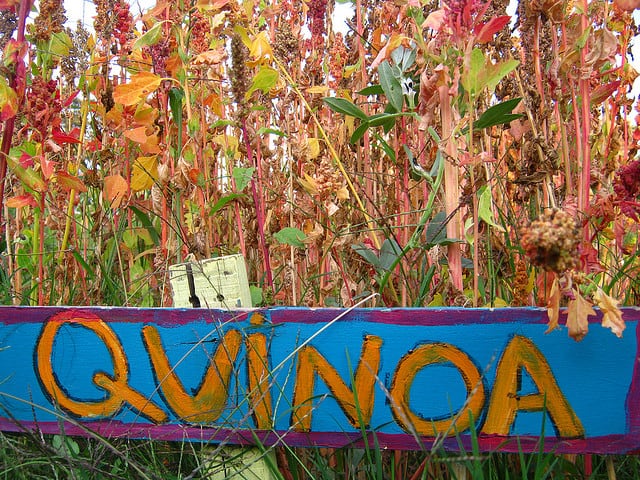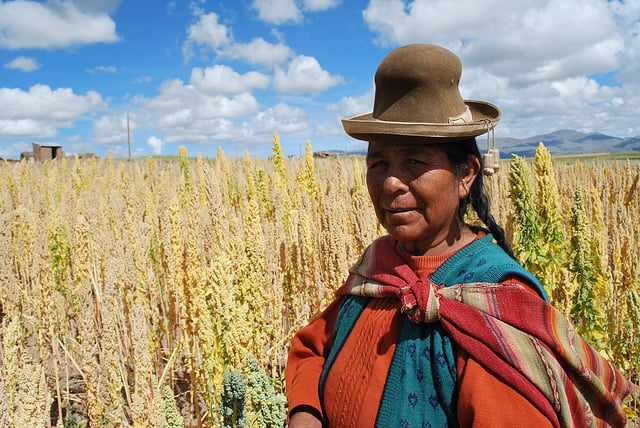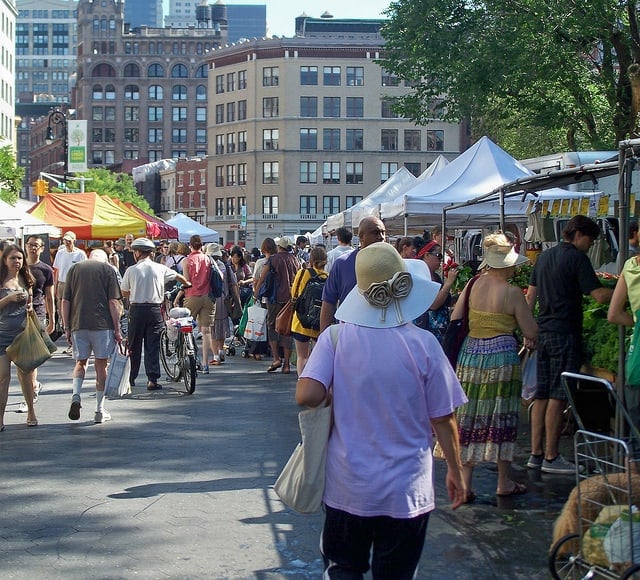I have many favorite places in New York City. One of my favorite places, and a place that always manages to surprise me, is Union Square on weekends. I am always amazed that there is a huge farmers’ market, where you can find all sorts of organic and even exotic foods, in one of the most densely populated cities in the world. You can find everything from artisanal cheeses to fresh wheat grass to microgreens. Once I get over my wide-eyed foodie-in-a-candy-store reaction, I have to ask myself an important question: is the variety and diversity of foods available at the Union Square farmers’ market, or at any venue selling exotic foods, sustainable?
Take the case of a very popular South American grain and the focus of this year’s UN Food and Agriculture Organization: quinoa. It is the seed of a spinach-like plant which is heavy on protein and amino acids but has no gluten and is low in fat, rightfully earning it the nickname “the miracle of the Andes.” The Guardian, a British newspaper, recently described quinoa’s accession to exotic foods stardom.
According to that newspaper, the plant is so popular that its price tripled between 2006 and 2012. The problem is that quinoa is now so expensive that locals for whom the plant was staple cannot afford it anymore. Bolivians and Peruvians, who used to eat healthy quinoa, now would rather sell it instead. Locals now “want rice, noodles, candies, Coke, they want everything!” says a local agronomist. Yes, the so-called First World reaps globalization’s benefits from popularizing this healthy food. But globalization shows just one wart on its ugly side when First World bad eating habits have been exported to Peru and Bolivia.
Of course quinoa is not the only complex, potentially ugly issue. The Guardian also mentions another problematic case, regarding asparagus: one region of Peru specialized in asparagus, created a drought in the region. Or back in the days when I was studying economic development as an undergrad, we looked at the case of Vietnam’s specialization into the production of coffee, which ended up in failure due to the increase of supply on the market which drove prices down. Different ills, but a similar issue: should we encourage countries to develop production into a particular good?
***
One of the earliest models in economics is David Ricardo’s comparative advantage theory. Ricardo elaborated on a simple concept: if your country makes one thing more efficiently (i.e. with less labor and/or resources) than any other country, the country should specialize in making this product. This is called an absolute advantage, and it is, indeed, quite absolutely straight forward.
Ricardo’s great point was that even when a country does not have an absolute advantage in any good, that country would still benefit from specializing if it only has a comparative advantage in one good. A comparative advantage means that a country produces a good more efficiently than another good, even if it does not produce the same good more efficiently than another country does. Using a simplified model1, Ricardo proved his theory by showing that a country should specialize in the good in which it has a comparative advantage, even if it does not have an absolute advantage in either good (that was revolutionary). It’s not just about being the best at something: everybody can benefit if agents on the market specialize in what they do relatively better. You can find a simple proof of Ricardo’s model – in its original British – here.
A country can have an absolute or a comparative advantage for many reasons. In agriculture, of course, major factors are climate and natural production. Since quinoa naturally grows in the Andes, Peru and Bolivia have a comparative (I would actually suspect, an absolute) advantage at producing it. Therefore, once enthusiasm over the product opened the global trade gates, it was logical for many food growers in Peru and Bolivia to specialize in the growth of quinoa. This specialization involved converting fields previously growing diverse types of crops into fields of quinoa alone. Economically, this has paid off for producers: remember that the price of quinoa has tripled creating a great boon for producers.
***
There remains the problem of the inability for Peruvians and Bolivians to afford their old staple, creating issues of malnutrition for local communities. In the case of the asparagus specialization, the corollary became a lack of water. Specialization may benefit suppliers, but have negative consequences for people at large. In economics, we call these unintended consequences “externalities.” Adverse indirect consequences are called “negative externalities,” and positive indirect consequences2 are called (you guessed it) “positive externalities.” All externalities end up costing or benefiting society. If a negative externality results from production of a good or service, the actual cost of production (accounting for the bad consequences to society) is higher than the producer’s individual cost of production.
To fix the difference between actual (communal) cost and individual’s perception of that cost (without taking externalities into account), we can make sure that the actual cost gets paid by the producer. A simple way to do this, as pointed out by economist Arthur Pigou early in the twentieth century, is to tax the product or service so that its total cost (with the externality) is accounted for. Economists call this a Pigouvian (or Pigovian) tax.3
To come back our quinoa farmers, we could ask them to pay a tax on their sales of quinoa (maybe even tax them in quinoa to minimize tax collection and food redistribution costs). We can then use that tax to distribute quinoa to locals – as a gift with something like a redeemable stamp system, or at a subsidized price. But, as you can see, it’s a bit more complicated: if anyone can get quinoa for free or at a reduced price, why wouldn’t they resell it at a profit to a distributor, make some money, and buy themselves another bottle of sugar-loaded soda?
In my view, the problem with externalities, especially with food, is a problem associated with perception. I know what the refreshing taste of cola X feels like. I have no idea yet what diabetes may feel like in ten or twenty years if I drink inordinate amounts of sugared soda or if my body (which for a Peruvian or Bolivian might be genetically programed through generations to assimilate a healthy food such as quinoa) does not process influxes of sugar very well. Fat, salt, sugar are all very satisfying to the taste buds, and when you’re starving and low on money, there’s nothing like a fast food super value meal to get your calories on the cheap. Our primal instincts (hunger, bodily satisfaction), sometimes override our rational reasonable decision-making.
***
The struggle we all face, then, is to really think about the consequences of our decisions. What may look good to me here and now may turn out to be a terrible habit that will cost me dearly in the future. I am not sure how my own fast food cravings will cost me in the long term. The same goes for healthy foods. If someone said to a farmer, “produce more of that healthy stuff, people love it” the farmer might think, “yeah, sure that sounds good; besides I’m sharing goodness with the world” but not necessarily consider that decision’s impact or consequences.
This comes down to two broad issues:
- How can economic agents properly evaluate the benefits and the costs of their decisions, over the long term and including possible unaccounted communal costs or benefits?
- How do we resist privileging known immediate benefits over and against less certain or predictable debilitating costs?
Shaping agents’ incentives while allowing room for choice and creativity is a very difficult thing to do. Michael Bloomberg, the mayor of New York City, has chosen to limit the risks of obesity by both limiting choices by forbidding larger sizes of sugared drinks, and informing consumers about calorie content of foods. From personal experience, I can say that neither really deterred me from enjoying a full fast food experience last time I visited New York, and I’m the guy who thinks and writes about this stuff! So I am not sure that this kind of regulation is the best answer to urges.
Education may be a better start. I think that if we all work hard at understanding, and teaching one another gently about virtue, we may be able to avoid a lot of damage down the road. Aristotle talks about the goal of virtue as leading to the mean between extremes. Gluttony is one extreme. Hunger strike is another. The truth lies somewhere in between. Most of us probably enjoyed rich and over-filling meals around Christmas time. The forty-day period of fast and abstinence of Lent is just a couple of weeks away.
I’m not suggesting a staccato approach to eating or to life. We don’t attain the mean of virtuous diets by overeating every Monday and starving ourselves every Tuesday. The quest for the mean, and the quest for virtue, really takes flesh in wondering why we do what we do. What are we trying to accomplish? What is the meaning of the mean we aim at? Through developing a life of virtue, we will all get closer to the issue of what our incentives and our goals are. In the long run, this quest may even help issues arising from global trade and help us cultivate more than a healthy miracle grain.
— — — — —
- Ricardo (1772-1823), being an Englishman of Portuguese descent, picks two countries (England and Portugal) and two goods (cloth and wine) ↩
- Say, your neighbor’s house extreme makeover, which ends up increasing the value of your house since its beautifies the neighborhood ↩
- This is a cool name to learn, because Pigouvian (my preferred spelling… people who care always have an opinion!) taxes are a big part of the “talk of the town” on pollution nowadays, as you can read here. ↩





